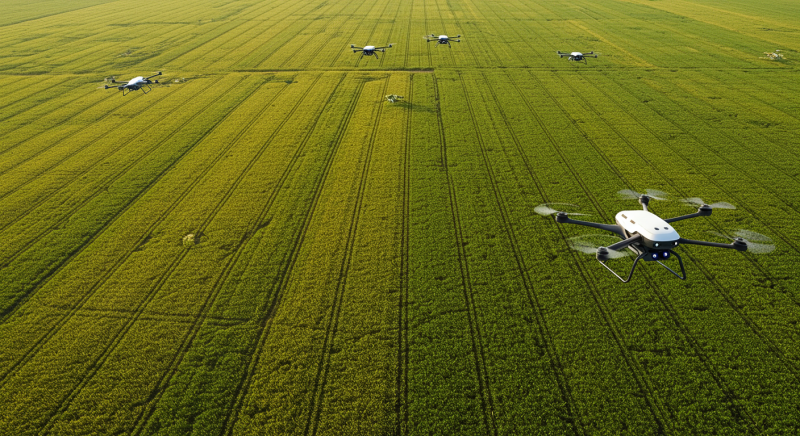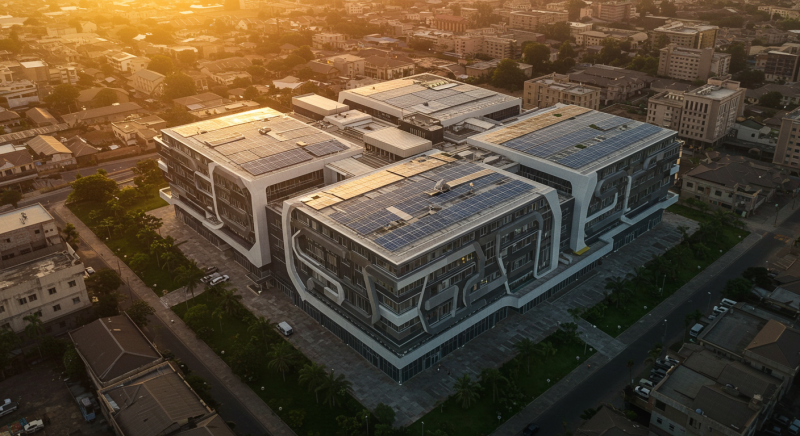The Future is Now: How Nigerian AI Startups Are Overcoming Funding Barriers to Transform Africa
In a bustling Lagos co-working space, a young entrepreneur stares at her laptop, her AI-driven diagnostic tool for malaria detection nearly ready for launch. But like 72% of Nigerian tech founders, she faces a daunting hurdle: funding. Her story isn’t unique—across Nigeria, brilliant minds are building chatbots to democratize healthcare, predictive analytics to boost crop yields, and computer vision systems to revolutionize logistics. Yet, securing Funding for Artificial Intelligence and Machine Learning Startups in Nigeria remains a steep climb. This article isn’t just a guide; it’s a roadmap to turn your AI vision into a funded reality.
Key Takeaways
-
Nigeria’s AI startup ecosystem has grown by 43% since 2023, with over 80 active ventures raising $120 million collectively.
-
Government grants, venture capital, and international partnerships are critical funding sources for AI/ML startups.
-
Tailoring solutions to local challenges (e.g., healthcare access, agricultural productivity) increases investor appeal.
-
Technical talent shortages and infrastructure gaps remain persistent barriers.

The Funding Landscape for Artificial Intelligence and Machine Learning Startups in Nigeria
Nigeria’s AI and ML sector is experiencing a transformative surge in funding, driven by a mix of local innovation, global investor interest, and strategic government initiatives. As of 2025, the country has solidified its position as Africa’s leading hub for artificial intelligence and machine learning startups in Nigeria, with over 80 active ventures collectively raising $120 million since 2023. This growth underscores the critical role of funding for artificial intelligence and machine learning startups in Nigeria in addressing continental challenges—from healthcare diagnostics to agricultural optimization—while attracting both domestic and international capital.
Growth Trajectory and Investment Surge
The funding ecosystem for AI and ML startups in Nigeria has expanded by 43% since 2023, fueled by innovations in fintech, healthcare, and agriculture. Recent data highlights that African startups—with Nigeria at the forefront—secured 289million in funding during January 2025 alone, marking a 1.6 million and $45 million, respectively, by aligning their technologies with pressing local needs.
Key Funding Sources for AI and ML Startups
Government Grants and Corporate Partnerships
The Nigerian government has prioritized funding for artificial intelligence and machine learning startups in Nigeria through initiatives like the National Artificial Intelligence Strategy, which allocated ₦3 billion ($3.5 million) to AI research in 2024. These funds are channeled into university hubs and startups addressing healthcare, agriculture, and financial inclusion. Corporate collaborations are equally pivotal, with companies like Terragon Group partnering with AI startups to refine data models. FarmCrowdy’s AI-driven soil analysis tools, for example, gained traction through strategic agritech partnerships, demonstrating how public-private collaborations can accelerate innovation.
Venture Capital and International Funding
Investors are increasingly drawn to Nigerian AI startups solving African-centric challenges. Firms like LoftyInc Capital, Launch Africa, and Atlantica Ventures actively back ventures with scalable solutions. VoyanceHQ, a predictive analytics platform, secured 120,000 from Techstars by demonstrating how its tools optimize supply chains for SMEs. International organizations also play a critical role, offering equity−free grants such as the 100,000 UNICEF Innovation Fund, which supported Kudi AI’s chatbot platform. Today, Kudi AI serves 1.5 million users, proving the viability of global funding pathways for artificial intelligence and machine learning startups in Nigeria.
Crowdfunding and Angel Networks
Platforms like NaijaFund and AngelList Nigeria are democratizing access to capital. Lush Plans, a wedding planning AI platform, leveraged micro-investors to fund its initial development before securing VC backing. These platforms emphasize relatable use cases, such as AI tools for smallholder farmers, to attract community-driven investments and foster grassroots innovation.
Challenges in Securing Funding for AI and ML Startups
Despite progress, structural barriers persist. Only 18% of Nigerian AI startups secure Series A funding, a stark contrast to 35% in South Africa. Infrastructure gaps, including frequent power outages and limited internet connectivity, cost startups an estimated $29 billion annually, hampering rural AI deployment. Talent emigration further compounds challenges, with over half of Nigeria’s AI engineers relocating abroad for opportunities. Additionally, the scarcity of high-quality, locally relevant datasets slows model training, particularly for niche sectors like vernacular language processing.
Sectors Attracting the Most Funding
Investors prioritize AI solutions with tangible social and economic impact. In healthcare, startups like Helium Health use machine learning to analyze patient records across 500+ clinics, improving disease trend predictions. In agriculture, FarmBot Nigeria reduced crop losses by 60% using drone-based computer vision for pest detection. Fintech remains a hotspot, with AI fraud detection tools saving Nigerian businesses ₦2.3 billion annually. Platforms like Paystack have cut fraudulent transactions by 37%, showcasing the transformative potential of funding for artificial intelligence and machine learning startups in Nigeria.
Future Outlook: Scaling AI Innovation
The funding landscape for artificial intelligence and machine learning startups in Nigeria is poised for exponential growth. Initiatives like Google’s $40 million tech fund and the NITDA Innovation Hub are providing startups with mentorship, infrastructure, and global market access. As renewable energy partnerships and local upskilling programs address infrastructure and talent gaps, Nigeria’s AI ecosystem is on track to reshape Africa’s digital future by 2030. By strategically leveraging grants, venture capital, and cross-sector collaborations, Nigerian founders can unlock the full potential of AI and ML technologies—turning local solutions into global innovations.

Proven Strategies to Secure Funding for Artificial Intelligence and Machine Learning Startups in Nigeria
Securing funding for artificial intelligence and machine learning startups in Nigeria demands a blend of innovation, strategic alignment, and persistence. As the nation’s tech ecosystem evolves, founders are leveraging proven methods to attract investors and scale solutions. Below, we break down actionable strategies that have propelled Nigerian AI/ML ventures to success, from Lagos-based healthtech innovators to Abuja’s agritech disruptors.
1. Leverage Government Grants and AI-Focused Initiatives
The Nigerian government has intensified efforts to support artificial intelligence and machine learning startups in Nigeria through grants and policy frameworks. The National Artificial Intelligence Strategy, launched in 2024, earmarked ₦3 billion ($3.5 million) for AI research hubs and startups addressing national priorities like healthcare, agriculture, and financial inclusion. Startups like Intron Health tapped into these funds by developing speech recognition tools tailored to Nigerian accents, improving diagnostic accuracy in rural clinics.
Actionable Insight:
Regularly monitor platforms like the NITDA Innovation Fund portal and the Nigerian AI Research Council for grant announcements. Align your pitch with the government’s Sustainable Development Goals (SDGs)—projects targeting maternal health or food security often receive priority.
2. Partner with Venture Capital Firms Specializing in AI/ML
Venture capital remains the backbone of funding for artificial intelligence and machine learning startups in Nigeria, with firms like LoftyInc Capital and Launch Africa actively scouting for scalable solutions. These investors prioritize startups solving African-centric problems. For instance, VoyanceHQ secured $120,000 from Techstars by demonstrating how its predictive analytics platform optimizes inventory management for Nigerian SMEs, reducing operational costs by 30%.
Actionable Insight:
Target investors with a track record in AI, such as Atlantica Ventures or Ventures Platform. Emphasize your startup’s scalability—show how your chatbot or computer vision tool can expand across West Africa with minimal adaptation.
3. Tap into International Funding Programs
Global organizations are bridging the funding gap for artificial intelligence and machine learning startups in Nigeria. UNICEF’s Innovation Fund, for example, offers 100,000 equity−free grants to start ups using AI to address education or healthcare disparities. KudiAI, a Lagos−based fintech startup, utilized this program to scale its multilingual chatbot platform, which now serves 1.5 million users across Nigeria. Similarly, the African Development Bank’s 40 million tech initiative supports AI-driven agritech solutions.
Actionable Insight:
Apply for programs like Google’s N2.8 billion AI talent development fund or the NVIDIA Inception Program, which provides grants and technical resources to early-stage AI ventures.
4. Forge Strategic Corporate Partnerships
Collaborations with established companies provide more than just funding for artificial intelligence and machine learning startups in Nigeria—they offer mentorship, data access, and market credibility. Terragon Group, a data analytics leader, partners with AI startups to refine customer segmentation models. Similarly, FarmCrowdy integrated an AI soil analysis tool developed by a Nigerian startup, boosting crop yields for 12,000 farmers and attracting follow-on investments.
Actionable Insight:
Attend industry events like GITEX Africa or the Lagos Tech Summit to network with corporates seeking AI innovations. Propose pilot projects to demonstrate your solution’s ROI, such as a chatbot reducing customer service costs by 40%.
5. Explore Crowdfunding and Community-Driven Models
Platforms like NaijaFund and AngelList Nigeria are democratizing access to capital for artificial intelligence and machine learning startups in Nigeria. These channels allow founders to pitch directly to micro-investors passionate about local impact. Lush Plans, an AI wedding planning platform, raised its initial $50,000 through crowdfunding by highlighting its use of machine learning to streamline vendor bookings—a relatable pain point for Nigerian couples.
Actionable Insight:
Craft campaigns that resonate emotionally. For example, an AI tool predicting neonatal risks could attract donations by showcasing its potential to save lives in underserved communities.
6. Showcase Traction Through Pilot Programs
Investors want proof of concept before committing to funding for artificial intelligence and machine learning startups in Nigeria. Launch pilot programs with measurable outcomes. Helium Health, for instance, partnered with 50 clinics to test its AI-powered patient record system, which reduced administrative errors by 65%. This traction helped them secure $30 million in Series B funding.
Actionable Insight:
Partner with NGOs or local governments for pilot deployments. For example, collaborate with a state agricultural agency to test your predictive analytics tool on 500 farms, then use the data to attract investors.
7. Prioritize Local Problem-Solving with Global Scalability
Investors increasingly favor startups addressing Nigerian challenges with solutions that can scale continent-wide. FarmBot Nigeria reduced crop losses by 60% using drone-based computer vision for pest detection—a model now being replicated in Kenya and Ghana. Similarly, Paystack’s AI fraud detection tools, which cut fraudulent transactions by 37%, have attracted interest from global payment giants.
Actionable Insight:
Frame your AI solution as “Nigerian-made, African-ready.” For example, a chatbot trained in Yoruba and Hausa can easily adapt to Swahili or Zulu markets.
Overcoming Common Pitfalls
While pursuing funding for artificial intelligence and machine learning startups in Nigeria, avoid these missteps:
-
Overlooking compliance: Register with the Corporate Affairs Commission and protect intellectual property early.
-
Neglecting talent retention: Offer equity to skilled engineers to curb emigration (57% of AI experts leave Nigeria annually).
-
Underestimating infrastructure costs: Budget for alternatives like solar power to mitigate $29 billion in annual losses from outages.
Overcoming Challenges: Infrastructure and Talent for Artificial Intelligence and Machine Learning Startups in Nigeria
Securing funding for artificial intelligence and machine learning startups in Nigeria is only half the battle—scaling these innovations requires overcoming systemic infrastructure gaps and talent shortages. While the nation’s AI ecosystem thrives with creativity, founders often grapple with obstacles that stall growth. Here’s how Nigeria’s tech pioneers are turning these challenges into opportunities.
Battling Infrastructure Gaps
Unreliable power supply and limited internet connectivity remain critical barriers for artificial intelligence and machine learning startups in Nigeria. Frequent outages cost businesses an estimated $29 billion annually, forcing startups to allocate up to 40% of their budgets to alternative energy sources like solar panels and generators. In rural areas, where AI solutions could transform farming or healthcare, only 35% of communities have stable internet access—a hurdle for deploying tools like drone-based crop monitoring or telemedicine chatbots.
To combat this, startups are leveraging funding for artificial intelligence and machine learning startups in Nigeria to build resilient infrastructure. For example, Lagos-based Agritech AI firm FarmBot Nigeria partnered with renewable energy providers to power its drone fleets, ensuring uninterrupted field scans for smallholder farmers. Similarly, government initiatives like the National Broadband Plan aim to boost rural connectivity, creating opportunities for startups to pilot AI tools in underserved regions.
Tackling the Talent Drain
Nigeria’s AI sector faces a paradox: while local tech talent is abundant, over half of skilled engineers and data scientists emigrate for better opportunities abroad. This “brain drain” stalls innovation, particularly for startups requiring niche expertise in areas like natural language processing (NLP) or computer vision. Without a steady pipeline of experts, even well-funded ventures struggle to refine algorithms or scale platforms.
To address this, funding for artificial intelligence and machine learning startups in Nigeria is increasingly tied to talent development programs. Startups like Intron Health collaborate with universities to sponsor AI bootcamps, training students in machine learning frameworks like TensorFlow while offering employment guarantees. Platforms like Data Science Nigeria have upskilled 5,000 developers since 2023, focusing on real-world applications such as building diagnostic chatbots for local dialects. Additionally, equity-based incentives and remote work options are helping startups retain top talent.
Bridging the Data Deficit
High-quality, locally relevant datasets are the lifeblood of AI innovation—yet many Nigerian startups lack access to them. For instance, training a chatbot to understand Nigerian Pidgin or Yoruba requires vast linguistic datasets that aren’t publicly available. Similarly, agricultural AI models need hyperlocal weather and soil data to predict crop yields accurately.
Forward-thinking founders are using funding for artificial intelligence and machine learning startups in Nigeria to crowdsource data creatively. Healthtech startup MDaaS Global compiled diagnostic records from 200 clinics to build an AI tool for detecting tuberculosis in X-rays, while fintech firm Kudi AI partnered with roadside merchants to gather transactional data for its fraud detection algorithms. These efforts not only improve model accuracy but also position startups as data custodians, attracting investor interest.
Strategic Partnerships for Sustainable Growth
Overcoming infrastructure and talent challenges demands collaboration. Startups are pooling resources through hubs like the Lagos AI Collective, where shared cloud computing facilities reduce costs by 60%. Others, like computer vision startup Zido, partner with telecom giants to access high-speed internet for real-time video analytics in retail.
Government-backed initiatives are also pivotal. The National Artificial Intelligence Strategy allocates funds for co-working spaces in Abuja and Port Harcourt, providing startups with reliable power and high-performance GPUs for model training. Such synergies ensure that funding for artificial intelligence and machine learning startups in Nigeria translates into tangible, scalable solutions.
The Road Ahead
While obstacles persist, Nigeria’s AI ecosystem is adapting rapidly. Startups that channel funding for artificial intelligence and machine learning startups in Nigeria into infrastructure resilience and talent retention are gaining a competitive edge. As solar energy becomes more affordable and upskilling programs expand, the next wave of Nigerian AI innovations—from Hausa-language virtual assistants to AI-driven traffic management systems—will be built on a foundation of sustainability and local expertise.
By prioritizing these challenges, founders not only secure investment but also lay the groundwork for solutions that redefine Africa’s technological future.
Success Stories: Nigerian AI Startups Leading the Charge
-
Intron Health: Raised $110k for African-accent speech recognition in healthcare.
-
Helium Health: Uses AI to analyze patient records across 500+ clinics.
-
54gene: Leverages AI for genomic research, securing $45 million in total funding.

Conclusion
Funding for artificial intelligence and machine learning startups in Nigeria is no longer a distant dream—it’s a tangible reality. By aligning with government priorities, targeting impact-driven investors, and addressing local challenges, founders can unlock transformative growth. As infrastructure improves and global interest surges, 2025 could be the year Nigerian AI reshapes the continent.
FAQ: Funding for Artificial Intelligence and Machine Learning Startups in Nigeria
Q1: What are the most common mistakes Nigerian AI startups make when seeking funding?
A: Many founders underestimate the importance of aligning their AI solutions with local challenges. Investors prioritize startups addressing Nigeria-specific problems, such as improving maternal healthcare access or reducing post-harvest crop losses. Another pitfall is neglecting to validate prototypes—launching pilot programs with measurable outcomes (e.g., a chatbot reducing hospital wait times by 30%) significantly boosts credibility when pitching for funding for artificial intelligence and machine learning startups in Nigeria.
Q2: Are there technical requirements to qualify for government AI grants in Nigeria?
A: Yes. Grants like the NITDA Innovation Fund often require startups to demonstrate technical viability, such as a functional MVP (Minimum Viable Product) and a clear plan for scalability. Solutions leveraging open-source frameworks (e.g., TensorFlow, PyTorch) or addressing SDG-aligned challenges, like climate-resilient agriculture, receive priority.
Q3: How long does it typically take to secure funding for an AI startup in Nigeria?
A: The timeline varies, but founders should expect 6–12 months for early-stage funding for artificial intelligence and machine learning startups in Nigeria. Grants and crowdfunding campaigns may take 3–6 months, while venture capital rounds often require longer due diligence. Startups with pre-seed traction, such as a pilot with 500+ users, accelerate this process.
Q4: Can foreign-owned AI startups based in Nigeria access local funding opportunities?
A: Absolutely. Programs like the African Development Bank’s $40 million tech initiative and Google’s AI grants are open to all startups operating in Nigeria, provided they address local or continental challenges. However, partnerships with Nigerian co-founders or institutions can enhance eligibility for certain government grants.
Q5: What non-monetary resources should AI startups seek alongside funding?
A: Mentorship, data access, and technical infrastructure are critical. Initiatives like the Lagos AI Collective offer shared cloud computing resources, while partnerships with universities provide access to research datasets. Investors like Atlantica Ventures also connect startups with global AI experts for guidance.
Q6: How do AI startups in Northern Nigeria overcome funding disparities compared to Lagos/Abuja?
A: Startups in regions like Kano or Kaduna are leveraging funding for artificial intelligence and machine learning startups in Nigeria through grants targeting rural innovation, such as the NIRSAL Agro Geo-Cooperative Fund for agritech. Collaborating with local NGOs to demonstrate impact (e.g., AI tools for Hausa-language education) also attracts investors focused on inclusive growth.
Q7: Are there ethical guidelines for AI startups seeking funding in Nigeria?
A: While formal regulations are evolving, investors increasingly prioritize ethical AI practices. Startups should ensure transparency in data sourcing (e.g., anonymizing patient records) and avoid bias in algorithms. Frameworks like the NITDA Code of Practice for AI provide voluntary guidelines to build trust with funders.
Q8: Can AI startups targeting global markets still secure Nigerian funding?
A: Yes, provided they solve a Nigerian problem first. Investors favor startups with a “glocal” approach—for example, a computer vision tool optimized for Lagos traffic management that can later adapt to cities like Nairobi or Accra. Demonstrating local traction is key to unlocking funding for artificial intelligence and machine learning startups in Nigeria with global ambitions.
Q9: What role do accelerators play in securing AI startup funding?
A: Accelerators like Techstars Lagos and CcHub’s AI Lab provide seed funding (50k–120k), mentorship, and investor networks. They also help refine pitches—for instance, emphasizing how a predictive analytics tool can scale across West Africa—to attract follow-on investments.
Q10: How can AI startups measure ROI to satisfy investors?
A: Define clear KPIs early. For example, a chatbot startup might track user retention rates or cost savings for clients (e.g., reducing customer service expenses by 40%). Agri-tech ventures could measure yield improvements (e.g., 60% fewer crop losses). Tangible metrics strengthen your case for funding for artificial intelligence and machine learning startups in Nigeria.
Q11: Is crowdfunding viable for hardware-focused AI startups (e.g., drones, sensors)?
A: Yes, but storytelling is crucial. Platforms like NaijaFund allow startups to showcase prototypes through videos—for example, a drone mapping farmland in Kebbi State—to attract community backers. Emphasize social impact, such as job creation for local technicians, to resonate with micro-investors.
Q12: What’s the first step after securing funding for an AI startup?
A: Prioritize talent retention and infrastructure. Allocate funds to hire mid-level engineers (critical for scaling) and invest in renewable energy systems to mitigate power risks. Startups like FarmBot Nigeria attribute their success to early investments in solar-powered drone charging stations.
READ MORE
Scholarship Opportunities: Funding Your Educational Goals
External Sources:
